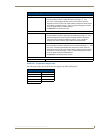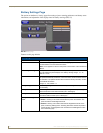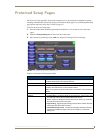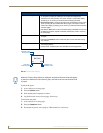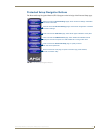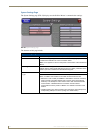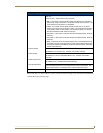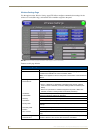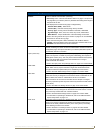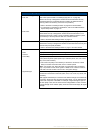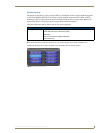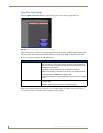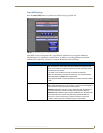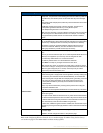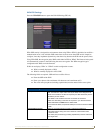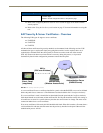
Protected Setup Pages
67
MVP-5200i Modero Viewpoint Widescreen Touch Panel
Wireless Settings Page (Cont.)
Access Point MAC
Address:
This unique address identifies the Wireless Access Point (WAP) used by this
panel for wireless communication (read-only).
• Site Survey button: Launches the Wireless Site Survey page. The options on
this page allow you to detect (“sniff-out”) all WAPs transmitting within range of
the panel’s Wi-Fi card.
Data displayed on the Site Survey page is categorized by:
- Network Name (SSID) - WAP names
- Channel (RF) - channels currently being used by the WAP
- Security Type - security protocol enabled on the WAP, if detectable
- Signal Strength - None, Poor, Fair, Good, Very Good, and Excellent
- MAC Address - Unique identification of the transmitting Access Point
• Refer to the Using the Site Survey tool section on page 27 for more detailed
information on the SIte Survey page.
• When communicating with a NXA- WAP200G, enter the MAC Address
(BSSID) of the target WAP as the Access Point MAC Address. Refer to the
WAP200G Instruction Manual for more information.
Wireless Security: Sets the wireless security method to be used by the panel to connect to the
network. Selecting any of the connection method buttons invokes the relevant
configuration page, with options that allow you to define parameters specific to
the selected method of connection.
Open (Clear Text) This button opens the Open (Clear Text) Settings page (FIG. 62 on page 70).
“Open” security does not utilize any encryption methodology, but requires an
SSID (alpha-numeric) entry. This entry must match the Network Name (SSID)
entry of the target WAP so the panel knows what device it is using to
communicate with the network.
• Refer to the Open (Clear Text) Settings section on page 70 for further details.
Static WEP This button opens the Static WEP Settings page (FIG. 63 on page 71).
“Static WEP” security requires that both a target WAP be identified and an
encryption method be implemented prior to establishing communication.
• Refer to the Static WEP Settings section on page 71 for further details.
WPA-PSK This button opens the WPA-PSK Settings page (FIG. 64 on page 73).
“WPA-PSK” security is designed for environments where is it desirable to use
WPA or WPA2, but an 802.1x authentication server is not available.
PSK connections are more secure than WEP and are simpler to configure,
since they implement dynamic keys but share a key between the WAP and the
panel (client).
• Refer to the WPA-PSK Settings section on page 73 for further details.
EAP-PEAP This button opens the EAP-PEAP Settings page (FIG. 69 on page 79).
“EAP-PEAP” security is designed for wireless environments where it is neces-
sary to securely transmit data over a wireless network.
• Refer to the EAP-PEAP Settings section on page 79 for further details.
• For information on uploading a certificate file, refer to the AMX Certificate
Upload Utility section on page 173.
EAP-TTLS This button opens the EAP-TTLS Settings page (FIG. 70 on page 81).
“EAP-TTLS” security is designed for wireless environments where having a
Radius server directly validate the identity of the client (panel) is necessary
before allowing it access to the network.
• Refer to the EAP-TTLS Settings
section on page 81 for further details.
• For information on uploading a certificate file, refer to the AMX Certificate
Upload Utility section on page 173.



